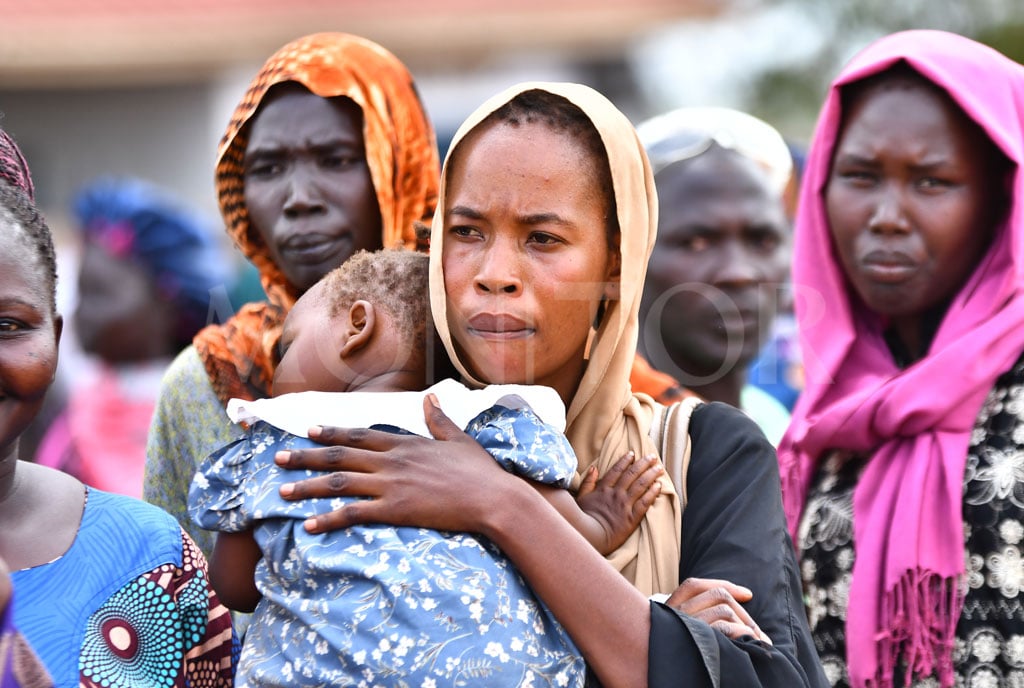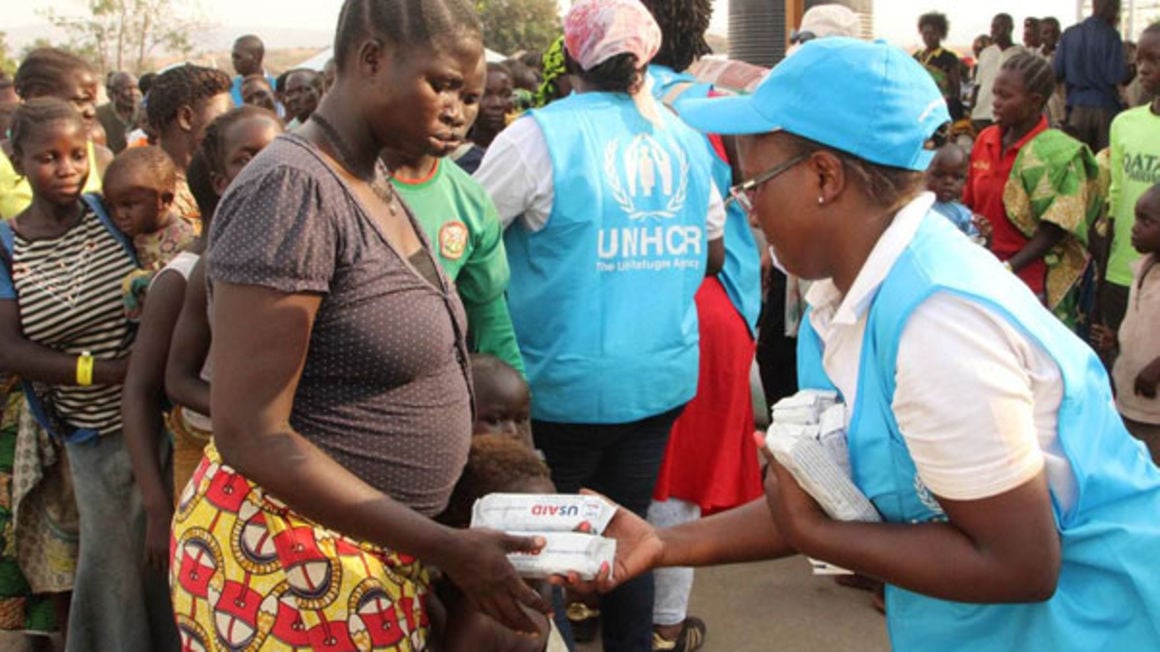Uganda’s refugee dilemma: Must approach go beyond basic aid?

Refugees gesture as they prepare to receive aid after humanitarian aids were delivered at a refugee camp in Kiryandongo, Bweyale District in midwestern Uganda on April 6, 2024. PHOTO/.MICHAEL KAKUMIRIZI
What you need to know:
- Uganda requires between $800million to $1.2billion annually to cater for refugees.
Imagine that one day a natural disaster or an attack overwhelms your town, leaving you with nowhere to flee. How would you respond? How would you endure?
That is the plight of almost all the more than 1.6 million refugees in Uganda, majority from restive nearby countries severely damaged by protracted conflicts for instance in South Sudan, war-torn Democratic Republic of Congo, Ethiopia and recently Sudan.
They currently reside in at least 13 refugee settlements across Uganda, which are managed and overseen by Settlement Commandants (SCs), who have some degree of autonomy.
But scenes in these camps are visibly concerning.
In the Kiryandongo settlement, which is managed by the United Nations High Commission for Refugees (UNHCR) in Bweyale District approximately 224 kilometers Midwest of Kampala, pale faces resulting from extreme heat, hunger, vulnerability and desperation welcome visiting people.
Most of these refugees, estimated at 100,000, are from the war-torn countries of South Sudan, Uganda's neighbor to the north, and the Democratic Republic of the Congo, Uganda's neighbor to the west.
At least 8,000 refugees of the above arrived in the settlement this year from Sudan where a devastating war that enters its second year in April has left thousands killed.
The UN estimates that 1,500 people are forced to flee raging battles in Khartoum every day to South Sudan, with some even making their way to Uganda.
But Ugandan authorities admit they "are under pressure" to manage this accelerating inflow.
“…and remember, they have come from a very harsh condition. They expect to be taken care of very well in this settlement. So, in the absence of services, we are afraid they can become very hostile,”Kiryandongo District Chairperson Edith Aliguma told journalists at the Magamaga refugee settlement last week as the camp received its first consignment of aid since January 1.
At the event, the United Arab Emirates (UAE) Embassy and United Nations Women agency delivered 375 tons of food consignments to the settlement, prompting chaotic scenes.
Violence lasting over 10 minutes erupted as women fought to get portions of cereal, sugar, flour, milk and other items donated by UAE. Ugandan law enforcement responded with force to restore sanity.

Refugees tussle to receive aid after humanitarian aids were delivered at a refugee camp in Kiryandongo, Bweyale District in midwestern Uganda on April 6, 2024. PHOTO/.MICHAEL KAKUMIRIZI
Many distribution agents who spoke to Monitor blamed fights for basic necessities on food rationing that relief agencies like the World Food Program (WFP) implemented due to tight budgets.
Following the incident, UN Women Uganda country representative Dr Paulina Chiwangu said that women and children make up 80 percent of the camp’s refugee population as she appealed for “further support to ensure their wellbeing.”
But Uganda’s government admits it “is also feeling a pinch in that regard.” Besides, Uganda said it was considering reevaluating its open-door refugee policy.
“We are sorry for the refugees, but [the country’s open-door policy] becomes a problem when it’s abused. Help us to feed these people…At the moment, refugees survive on one meal a day [instead of three]. This has forced some of them to turn into thieves and prostitutes to make ends meet,” minister of relief, disaster preparedness and refugees Eng Hillary Onek was quoted by this publication last month.
According to Onek, Uganda requires between $800million to $1.2billion annually to cater for refugees.
Now, the UAE, through its ambassador Abdalla Al-Shamsi, observed that the gulf state aims to advance the right to food by focusing on the unique nutritional requirements of women and girls and hastening the shift toward more equitable, gender-responsive, and sustainable food systems.
Approximately $5million is spent each month by the WFP on the welfare of refugees in the country, according to new data.
UNHCR and other similar organizations also use this kind of approach to support the over 1,000 refugees that arrive every day into Uganda’s borders.
But some critics contend that this approach is flawed because the majority of refugees classified as "self-sufficient" or "moderately vulnerable" only receive around 30 percent of the standard rations provided by the WFP or less, with the remaining 60 percent going to the refugees classified as "highly vulnerable."
Still, a large number of refugees questioned in the Magamaga refugee settlement were unaware of the WFP's classification system for vulnerability, given that "some of the very vulnerable, like the disabled and ones with children, were put in different categories that receive lesser [food] rations."
WFP's Deputy Country Director for Uganda, Marcus Prior, clarified that the Office of the Prime Minister (OPM), WFP and the UN Refugee Agency held extensive consultations that led to the development of the new needs-based approach to food assistance.
But the UN agency warns that "WFP and partners are expecting to face severe funding shortfalls in the coming months, which will necessitate further assistance cuts."

A woman cries after law enforcement used teargas to disperse refugees tussling to receive aid after humanitarian aids were delivered at a refugee camp in Kiryandongo, Bweyale District in midwestern Uganda on April 6, 2024. PHOTO/.MICHAEL KAKUMIRIZI
Already, budgetary constraints have compelled the WFP to feed the highest rations to 14 percent of the refugee population rather than the 25 percent it had originally planned.
“The issue of refugees is a very challenging one. It’s not just an issue for Uganda as a country. We know we have conflicts in South Sudan. We need all of us to work together to make sure that we end this conflict that is mounting these refugees, just like in DR Congo,” said Dr Chiwangu.




